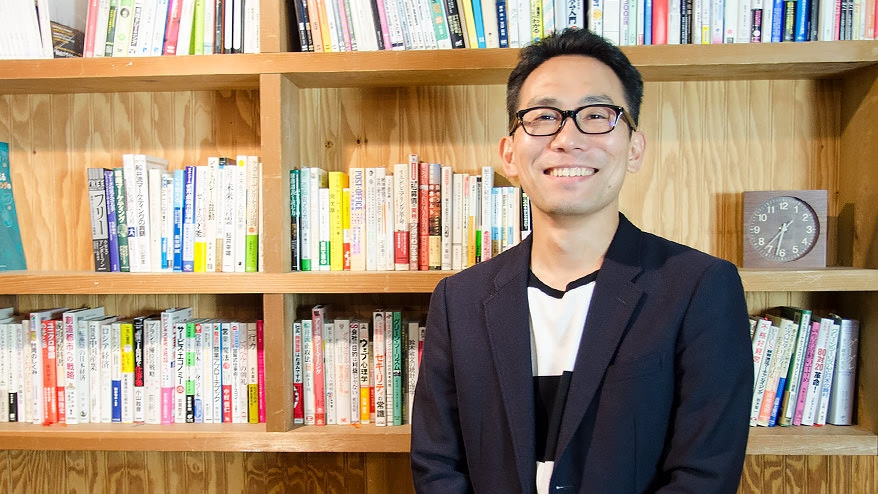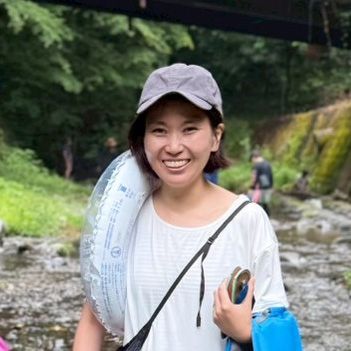This month's Meguru Measashi is freelance writer Kensaku Saguchi. He is the person who compiles the interviews for this column, " Meguru Measashi ," and " I'll sell your company! "
He usually works behind the scenes as a writer for the Monosasu site, but this time he'll be coming out into the open as the person being interviewed.
As an insider for the Monosasu website, Saguchi-san has been writing for us from the very beginning. What kind of person is he, and what does he think about when he works? We interviewed him from the editorial office to find out more, and we will share the contents of that interview in two parts .
table of contents
Part 1 : The path to becoming a writer as a way to make money
- How Saguchi met Monosus
- Apparently writing is profitable... A formative experience in Yugawara
- I found the most reliable way to earn money using the skills I have.
- Thirty years of conflict with my mother
Part 2 : I will write articles to convey the message that "it's not so bad even if it's hard"
- Differences between interviews and counseling: how to listen
- I wrote an article titled "It's not so bad even if it's hard" about a big, flowing river.
- I want to work hard in this business so that orders don't run out.
- A letter to Mr. Saguchi
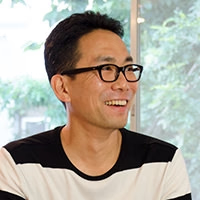
Profile of Kensaku Saguchi :
Freelance writer/interviewer He began his writing career in 1992 as a data man for the monthly magazine BIG Tomorrow (Seishun Publishing). Since then, he has been active in magazines, books, websites, and advertising production, focusing on interviews with people. He also writes about seven books a year, mainly business and health books.
How Saguchi met Monosus
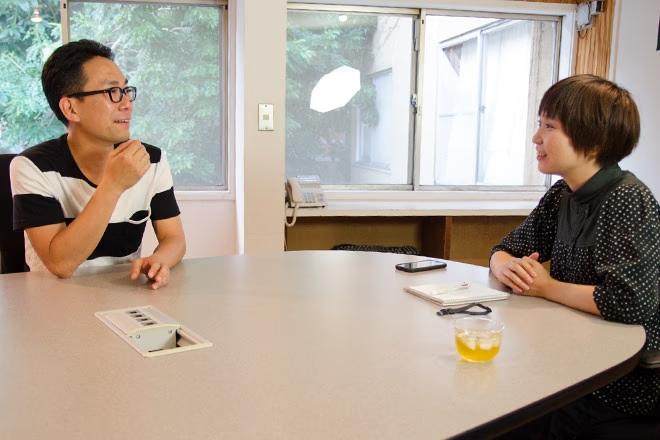
Speaker Kensaku Saguchi (left), listener in the courtyard (right)
Our relationship with Nakaniwa Saguchi began about three years ago when we asked him to create content for a certain confectionery manufacturer. He cooked in our kitchen to plan an article.
Saguchi (hereafter, titles omitted)
At the time, I wondered if it was okay to be cooking so noisily behind the people who were quietly working on their computers. It was interesting.
After a short break from that work on the courtyard , I was asked to consult on the lighting for this corner called "The Circling Ruler."
I had an outside writer help me with "Meguru Monasashi," but at first, I was inexperienced in directing myself, and I couldn't decide on the writing style, tone, or quality, so I groaned every time I went along. That's when I remembered Mr. Saguchi.
When I asked him, everything went very smoothly, so I felt like I couldn't let Saguchi-san leave the site that measures him! (laughs) I am very grateful.
Saguchi is so itchy (laughs).
When I first received the request from Nakaniwa-san, I wondered what he was going to do.
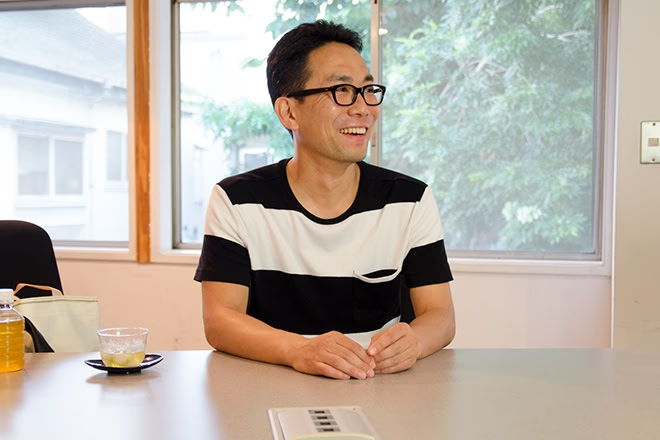
That 's right. It's a media whose outline is unclear, and I think it was probably difficult for the writer, but Mr. Saguchi accepted it easily. I was surprised that he wrote it as if he was a Monosus insider from the first article. It's like he has the power to fit in easily... Can you do that naturally?
Saguchi : What can I say... The thing that was bothering Nakani this time seemed to be something intuitive, so I decided to read the Monosas site carefully.
I thought it was something like connecting and amplifying the positive energy of working people. It's not about looking cool, but about showing how to speak in natural language, how to be useful to society, and how to create an environment where the person can work with enthusiasm.
What kind of atmosphere is needed in the manuscript? It is necessary to make adjustments, so I was glad that this time we were able to match up relatively well from the beginning. When I submit the first draft, I always get nervous, no matter how many years I've been working.
Apparently writing is lucrative...
A formative experience in Yugawara
What made you decide to become a writer in the first place?
Saguchi
I went to Yugawara for an interview with Tochizawa-san about Meguru Monasashi . I think I mentioned that I grew up in Yugawara, and my mother was a housekeeper in Tanizaki Junichiro's house. After Junichiro passed away, I grew up in his house with his wife Matsuko, and I grew up until the third or fourth grade of elementary school. As I became more aware of things, I realized that my parents were getting their salary from this grandmother. So I wondered what my grandmother was doing, and sometimes she would write something with a fountain pen. She seemed to be writing essays, and when she finished writing, the editor would come to pick up the manuscript in a black hire car, since it was still the Showa era. She would respectfully accept it and leave.
My grandmother herself is not that great, but her husband is Junichiro Tanizaki, a top-ranking author whose manuscripts were used to build the Chuokoron building.
I could vaguely see this structure and thought that writing would be profitable, but that was a misunderstanding from the beginning.
Courtyard (lol)
Saguchi: Well, the publishing world was relatively close to me, so I had an image of it, and then my mother's life took many twists and turns, and my own life also took many twists and turns along with it...
Courtyard twists and turns?
Saguchi's mother had been divorced twice, and had run away from home during the day and had a lot of other experiences that led to her becoming a twisted teenager.
So, when you graduate from high school, you have to go on to higher education, whether you go to college or not.
So, I wanted to work in magazines, but I didn't want to study for exams, so I looked into it and found a vocational school where several students had apparently been employed at the editorial department of a computer magazine called "LOGiN," which I had always admired. I thought that if I went to this school, I might be able to go in that direction, so I enrolled.
So, when I went to college, there were a lot of classes where we had to write, and one day, in a class with a cool name like "Comparative Cultural Studies," we were shown an Elvis Presley video. We were asked to write about our thoughts on the video in about 800 characters, and when we wrote it, the teacher read it out loud in front of us and said, "It's pretty good." At that moment, I thought, "Maybe I can do this!" (laughs).
Up until then, I had rarely been praised for my writing, and when I wrote a book report, my teacher would actually get angry at me, saying that it wasn't what I wanted. But this time, I wrote a proper piece, my teacher said it was interesting, and my classmates thought it was great, and for the first time I experienced this. It made me realize that there was another way to write.
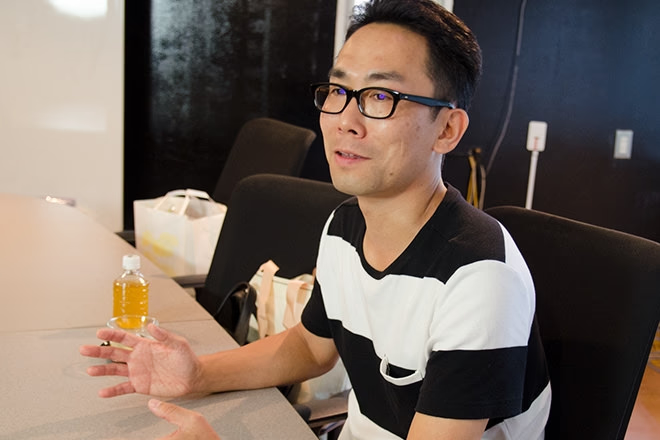
With the skills I have,
I found the surest way to make money.
Saguchi: At that school, around 30 students went on to work in the publishing industry each year, but I was part of the baby boomer junior generation, so there were a lot of students there, with five classes each with 40 students in each.
Simply put, you can't get in. It's a very narrow gate.
I realized that if I just sat around, I would end up just having graduated from school, and since I was from a single-parent household, I had to earn money, so I wondered what to do.Then, by chance, I heard that the editorial department of "Monthly BIG Tomorrow" (Seishun Publishing), where I still work, was looking for a young apprentice. I said "I'd like to do it," and when I went to the editorial department, they told me to "go and do some research in two days."
courtyard
Two days later (lol).
Saguchi: So I put on a suit and went to a sleep professor at Tokyo Medical and Dental University with my editor, listened to a talk about effective ways to take a nap, and came back excited. My job was not to write an article, but to hand over the transcription to a veteran writer called an anchor, and when I did that, I was paid a certain amount for 400 characters. I thought I was getting a lot. It seemed like the transcription wasn't too bad. I continued to do it the following month, gradually increasing the number of interviews.
At the same time, a friend from school was working part-time at an editing production company that publishes a game magazine called "Famicom Tsūshin" published by ASCII, and she asked me if I wanted to try writing about 20 100-character articles introducing new CDs and videos, so I gave it a try. The editor didn't think I could write right away, so he assigned me to a strict desk person. And that person was really nice. I didn't have email yet, so I had to fax the article I wrote, or write it on the editor's computer and print it out in front of him, but when I handed it over, he took me to a private room and said, "No good at all" (laughs).
The courtyard is no good at all?
Saguchi
He would come back with 100 characters written in bright red. I was shocked, but when I corrected them he said that this was definitely easier to understand, and he worked with me like a red pen teacher for about three months. Once I was able to write a productable piece of text of around 100 to 120 characters, he started paying me by the page. That was 20,000 yen for four pages, published twice a month, which was pretty good money for an 18 or 19 year old. With money coming in from my work on "BIGtomorrow", I was able to earn a little over 200,000 yen before graduation, and as I hadn't done any job hunting at all, I had nowhere to go and just became a freelancer.
I never had any ambition to become a writer, but once I started working, it was really interesting. On the pretext of interviews, important people would talk to me, even though I was a kid who didn't even know how to make a phone call, and I even got a CD as a sample of the new release.
I'm glad that I found a place where I could earn the most money with the skills I have at an early stage. I wrote it properly, and people told me it was good, and it was printed and lined up in bookstores, which made me really happy.
Previously, in an interview for "Meguru Monasashi," Matsuno from AXSIS said how happy he was when the first magazine he designed was put on the shelves of bookstores.
There was a courtyard .
Saguchi: I was listening to you and thinking, "That's amazing, that's true." The first time I wrote a bylined article was about five years after I started working, and it made me super happy.
CourtyardBy the way, did the same thing not make it into the novel?
I thought novelists like Saguchi were cool and I have written some. But I have never finished a story.
It would have been nice if I had come from a wealthy family, but unfortunately, I had to make a living and send money to my parents, so it was not possible.
Well, that's right... I've also published books like this.
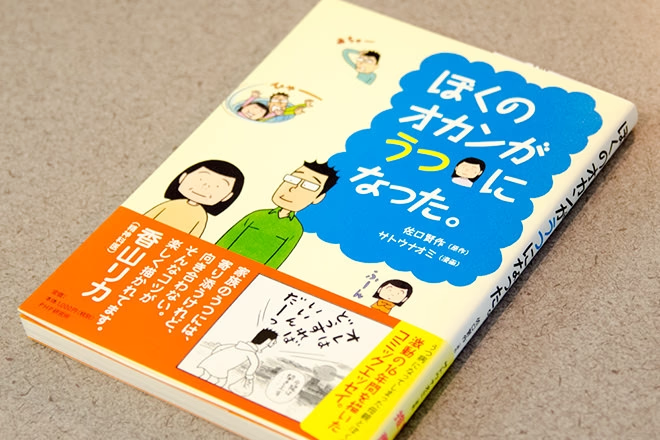
Courtyard "My mother became depressed."*
Saguchi: This book describes the half century...no, 30 years of being controlled by my mother.
*Kensaku Saguchi (author), Naomi Sato (illustrator) "My Mom Got Depressed" PHP Institute 2010 Amazon
Thirty years of conflict with my mother
Saguchi: I started living alone for the first time when I was 25 years old. I was making enough money to live on my own while still providing money to my mother, and I was feeling a bit burdened by her depression, so I wanted to get away from her, but once I did, I was pulled back in.
In 2010, my book "My Husband Got Depressed" had just become a hit, so I pitched it to my editor, saying, "My parent's depression has been going on for quite some time now and it's been really tough. 'My Husband Got Depressed' is about a spouse, but I thought it would be good to write a story about how children have a really hard time when their parent is depressed." At first, I wrote it just in words, but they said it was too heavy, so I made it into a comic essay.
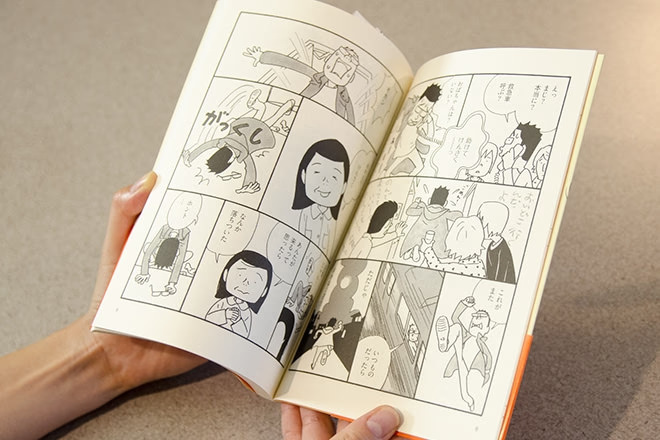
Courtyard: Does your mother live somewhere else?
Saguchi : Yes, in Chofu. I bought an old apartment. I don't think she'll be with anyone, she won't have a job, and she doesn't seem to have any intention of going back to the countryside. It's better than letting her live in a rental (laughs).
You've been holding it in the courtyard all this time.
Saguchi: That's true. Your financial situation and your range of activities are always quite limited, so it must be pretty tough.
So I thought that if I wrote this book and continued writing about the issue of depression as a writer, maybe I could pursue a career as a journalist.
I also went to get qualified as an industrial counselor, and thought it was great, so I gave it a go, but I realized something very obvious: even though I already have one in my family, listening to such heavy stories during interviews would be extremely tiring, so I quickly gave up.
CourtyardEven so, you've done it a few times for work.
For a while I was doing a serialisation on a website run by a publishing house called Saguchi Medical Publishing, in which I interviewed nurses and others aimed at people who also had parents with depression, but I felt like something wasn't quite right.
What do you mean the courtyard is different?
Saguchi: Um... I empathize too much with them. It feels more like volunteering than work. Even when I'm doing the interviews, it's tough. I can't find it interesting.
Also, I didn't know how to convey it to the readers. Maybe I was too close to them. I realized once again how amazing journalists are.
You have a problem, you investigate it for a year or two, and then you write a book. I wonder how you change your mindset and get back on track when you're dealing with a lot of terrible and painful stories. When I have the opportunity to meet people who deal with poverty, who go to war, who investigate unsolved cases, I always ask them, "Isn't it hard?" It seems that you can't learn how to distance yourself from your subjects without training.
